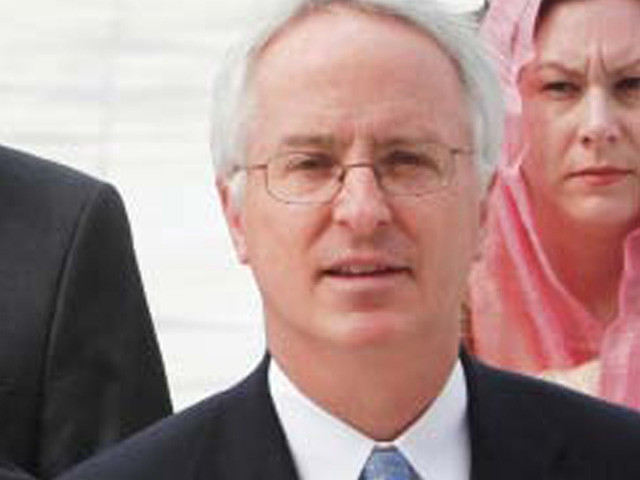‘The US is committed to stay’
New US Ambassador Cameron Munter pledges to stick with Pak, Afghanistan.

A change of face more often than not means a change in strategy. While this may not be apparent in the short while the new United States’ Ambassador to Pakistan has been in the country, there were some hints during his first press conference since he took the post.
Addressing media at the residence of the US Consul-General in Karachi on Friday, Cameron Munter – the US’ new point man in perhaps the most strategically important country in the world currently – said that President Barrack Obama’s policy of pulling out of Afghanistan was being “misinterpreted”.
“We are committed to the success of Afghanistan, as we are to Pakistan,” said the ambassador, adding that there would probably be a “change in face” but not a “withdrawal”.
“We are committed to stay,” he asserted again – not only because the US has promised Afghanistan, but because they have promised Pakistan.
The statement is significant on many counts.
Firstly, there is a very palpable apprehension in Pakistan that, with the withdrawal of the US from Afghanistan, there will be a shift in Washington’s focus from the region. That would have meant diminishing Pakistan’s strategic importance.
And that takes us back to the 80s, when the US’s intimate ideological alliance came to an abrupt end following the defeat of the Soviets in Afghanistan. And with the shifty relations between Washington and Islamabad and the arrival of a new point man, this fear was as real as it gets.
As expected, this question was posed. What about history, Mr Ambassador?
Munter chose to assuage these doubts with evidence, rather than just rhetoric.
He pointed to multi-year programmes that the US has embarked upon in Pakistan. “We don’t have these with all countries – it is unusual.” He added that, even if the US was thinking of a rethink, “We are committed by our legislation.” Referring to the Kerry-Lugar Act and military aid programmes, the Ambassador said that the US has “written it [supporting Pakistan] in our law.”
Effectively, the ambassador’s first speech in Pakistan was laced with assurances – fresh assurances from a new face.
He empahsised that his mission and that of the Obama administration was to, “represent diplomatically, but represent from the heart.” Downplaying differences between Washington and Islamabad, Munter said that the US didn’t expect Pakistan to listen to everything it said. “Friends can disagree.”
He also commented on the constant calls to “do more” – an expression that strikes a sour note in Pakistan. Recognising that the expression was insensitive and curt, he said that the same request can be explained and worded differently. He also spoke of the perceived dislike that Pakistanis have for the US. “I don’t think that the Pakistanis don’t like us – I don’t believe that,” he said, adding that there was instead “healthy scepticism.”
He spoke at length about how the US was looking to engage all sections of Pakistani society, and not just the political leadership. On the issue of the Coalition Support Fund, he said that reimbursement was a long and cumbersome process, but added that the US had committed $700 million at the recently concluded strategic dialogue.
The ambassador said that a Free Trade Agreement (FTA) and ROZs were also discussed at length during the dialogue. “We’re a little embarrassed because the Europeans are ahead of us [in terms of the FTA]; we like to think we are the dynamic ones.”
He said that US was optimistic about the future of Pakistan, especially Karachi, with its big business and major port. Munter also attached great importance to President Asif Ali Zardari’s visit to the US next year, saying that significant progress had been made in each of the 13 working groups. On the power front, he said that the plan to build a 150 MW wind farm in Sindh under private-public partnership will soon be completed.
On the floods, the ambassador said that the US was committed to helping Pakistan, pointing out that US flood relief efforts had delivered over 20 million pounds of supplies to the affected and rescued 23,000 people since August 5.
However, he added, it was not only about immediate need, but the way forward. He stressed that while the US was leading the global assistance effort to Pakistan, they would follow Pakistan’s plan, and not impose their own.
Published in The Express Tribune, October 30th, 2010.



















COMMENTS
Comments are moderated and generally will be posted if they are on-topic and not abusive.
For more information, please see our Comments FAQ